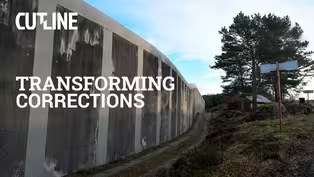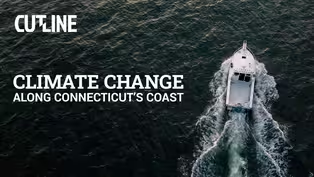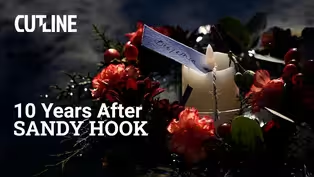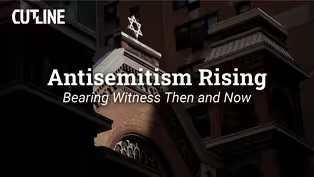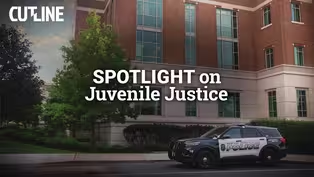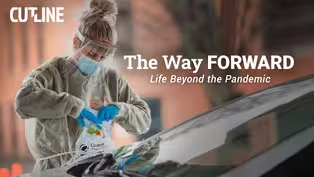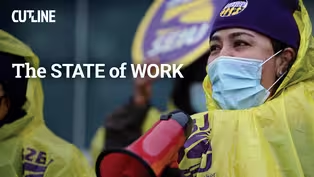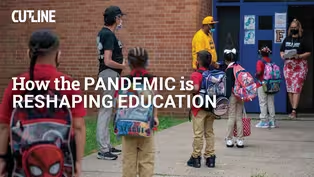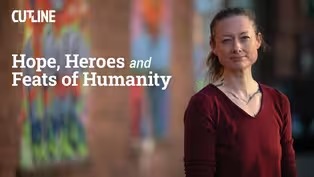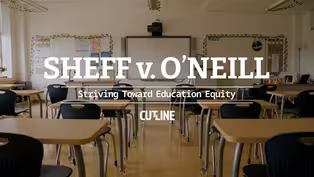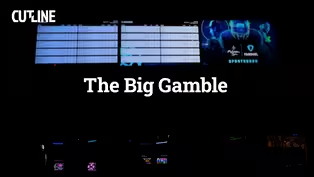CUTLINE
The Cost of COVID - Personal Stories from a Year of Loss
Special | 58m 1sVideo has Closed Captions
The very personal and harrowing costs of COVID are explored.
This story is about the very personal and harrowing costs of COVID, one year into the largest public health crisis we have ever faced.
Problems playing video? | Closed Captioning Feedback
Problems playing video? | Closed Captioning Feedback
CUTLINE is a local public television program presented by CPTV
CUTLINE
The Cost of COVID - Personal Stories from a Year of Loss
Special | 58m 1sVideo has Closed Captions
This story is about the very personal and harrowing costs of COVID, one year into the largest public health crisis we have ever faced.
Problems playing video? | Closed Captioning Feedback
How to Watch CUTLINE
CUTLINE is available to stream on pbs.org and the free PBS App, available on iPhone, Apple TV, Android TV, Android smartphones, Amazon Fire TV, Amazon Fire Tablet, Roku, Samsung Smart TV, and Vizio.
More from This Collection
Connecticut Public’s monthly deep dive into current issues, ideas and events that are most on our minds in Connecticut.
Video has Closed Captions
Explore how leaders and policy makers are trying to transform corrections in Connecticut. (47m 25s)
Climate Change Along Connecticut’s Coast
Video has Closed Captions
Learn about Long Island Sound’s importance and how its communities need to be protected. (51m 10s)
Video has Closed Captions
A look at the decade after Sandy Hook, and what has changed since the mass shooting. (53m 26s)
Antisemitism Rising: Bearing Witness Then and Now
Video has Closed Captions
Hear personal stories of the Holocaust and look at links between antisemitism & extremism. (57m 14s)
Video has Closed Captions
The Accountability Project takes a deep dive into Connecticut’s juvenile justice system. (56m 49s)
Video has Closed Captions
Learn how COVID and a collapsing childcare industry are impacting kids’ wellness. (57m 50s)
The Way Forward: Life Beyond the Pandemic
Video has Closed Captions
A look at the people and organizations helping shape life beyond the Pandemic. (57m 28s)
Video has Closed Captions
An exploration of the ways work has-- and has not-- changed as a result of the pandemic. (56m 17s)
How the Pandemic is Reshaping Education
Video has Closed Captions
We explore how the COVID-19 pandemic has reshaped education. (56m 40s)
Hope, Heroes and Feats of Humanity
Video has Closed Captions
Meet people from CT who’ve done audacious things over the course of a difficult year. (54m 28s)
Sheff v. O'Neill: Striving Toward Education Equity
Video has Closed Captions
Sheff v. O’Neill has created a model for school integration programs, and controversy. (55m 54s)
Video has Closed Captions
Connecticut has legalized sports betting. Where does the money go? What about the tribes? (53m 36s)
Providing Support for PBS.org
Learn Moreabout PBS online sponsorship- [Narrator] Funding provided by Hartford HealthCare.
(bright soft music) (wind whooshing) - [Narrator] It's been one year since the coronavirus took over our lives.
In Connecticut, 300,000 people have been infected.
Nearly 8,000 people have died.
But the cost of COVID-19 goes beyond the numbers.
This hour we'll hear stories of loss, survival, grief, and love.
We'll hear about the true impact of living through a pandemic on our state, our neighbors, and ourselves.
This is Cutline.
- You don't think about a pandemic coming.
This is, you know, the year 2020.
We are so advanced with the United States.
We have everything in our powers in medicine.
But when it happened and I saw the first one and we're like, okay, what are we gonna do?
Like how are we gonna fix it?
This is a respiratory virus, like... Just seeing them and it happened so fast.
It was one patient then it was from one patient to 14 patients within like the end of the week.
And we running these ventilators and, you know, getting the emails about other countries running out of ventilators, running out of respiratory equipment like we don't have enough, and us trynna, pulmonologists, trynna wrap our hands around it and figure out how we're gonna fix this and how we're gonna make them better.
And we can fix it because we went to school for, you know, four years, two years, there's an answer.
And then watching them one by one...
I like the word transition, I don't like the word, you know, die, I never liked the word.
Transition and with everything we can, finding every, looking at other countries 'cause they had it before us trying to find the cure.
It was heartbreaking because families are calling, wanting answers and what can you say?
You see these people begging for their lives and you're like the last person they're going to see before you intubate them.
Like we're the ones that have to take them off the machine and we know that those are their lungs.
And it's hard and when you try so hard and you pray so hard and you... (instrumental music) And they have families and then you have the families calling or they come and they cry.
They asked me just recently, this is like three weeks ago, he didn't want anything and she, the wife was at the bedside and she was... She was, "You can fix him."
And I couldn't, I really knew I couldn't fix him but she was, "You gonna breathe life into him."
I couldn't.
And I hold her and I said I'm sorry.
I was like I tried.
We all try.
But I couldn't fix him, I can't... We can't fix them all.
(slow music) So we have each other to cry on and, you know, the tech was there.
I held her and I said... She was, "I had hope."
But don't let go of hope because you'll be surprised.
It's taxing.
It's hard.
It's hard to tell people that this is real.
That having a patient beg for you to help them breathe.
And their bodies just kind of...
There's a certain way that people, you know, when you're trying to catch your breath, we, as a medical professionals, respiratory care, aides, we have to go to work.
Yeah, I'm blessed to have a job and I'm thankful, for that I have a job 'cause everybody tells me that this is what you sign up for.
I didn't sign up to risk my life, because people wanna go out there and be reckless.
None of us signed up to risk our lives for reckless people.
I can't see my mom, but I can talk to my mom.
I can FaceTime my mom, my niece, my cousins, my friends, aunts and uncles.
And I'll take that over me having to say my last goodbye on a iPad.
We never know when they're gonna go.
We never do.
And you know what?
It's lucky if some of us is in there, to be with them.
But we can't be with them for hours 'cause sometimes they're for hours.
But best believe when they're transitioning in that hospital they are nurses and the techs go in there and we tell them they're loved and they fought a good fight.
And we tuck them in and we remove everything out that we can.
And I open the shade so they know where heaven's at.
A lot of therapists are, you know, we shouldn't be recognized.
It's a respiratory pandemic.
It's the year of nurses.
I say no.
It's the year of healthcare workers.
Because at the end of the day, like I said, that aide that went in there and took care of them for five minutes, they're just as important as we are.
The people who come and clean, are just important as we are.
And I'm able to breathe life into people.
We are able to breathe life into people.
So at the end of the day, we don't need a pat on our back, it's nice.
But we know we can't go to sleep knowing that we were able to keep this person going.
It can happen to you.
I don't care, "Oh, it can never happen to me."
No, it can.
Live life to the fullest.
Have that extra piece of chocolate cake like that patient told me, before she passed.
She was, "Oh!
I wish I would have had that last piece of chocolate cake, Kat."
Have that chocolate cake.
(slow music) - At the beginning, I wanna say March, we just got back from vacation and we were seeing on the news at home everything that was happening in New York city with all the refrigerator trucks going down for temporary morgues and we're just like devastated of what was going on.
And at that point I decided, because I have COPD and I'm autoimmune, my husband says, "You have to protect yourself."
He went to work and got me the N95 masks.
So I was wearing them from probably March 13th on and we, the company, we did not get PPE until late April.
And I wanna say early April, the gentleman that works in the deli department, Elijah, his grandmother works at the Lutheran Church, they made us our PPE.
They brought us 30 masks a day for the employees.
And then probably late April is when the company finally got masks for us.
I was back in 1978, was a part-time job, and I was a junior in high school, and I started working as a cashier and years went on, that'll be 45 years when I'm done.
And that's a milestone.
I mean, it was so scarce.
The shelves were empty, not enough people to put up the product, the supply was there and then the supply chain broke.
And then there was nothing.
The toilet paper aisle was gone.
The frozen food, the vegetables, meat department, it was totally empty.
My husband Kirk, is a supervisor at Concrete Support in Bloomfield, Connecticut.
So he goes out and he has his COVID test taken and that was on a Saturday.
Monday he calls me at work and says, "Nancy, I'm positive."
I was shocked.
I said, "You can't be."
And he says, "Yes, I'm positive."
So I went and got tested, I tested negative.
For four days, everything was fine.
Then he hit a brick wall.
The fever started, the chill started and he went downhill.
My nephew is a PA and he called and said, Nancy makes sure that he's hydrated.
Look out for these signs.
He sent me a little oxygen meter.
One day I put the meter on him and it tanked down to 85.
So I remember driving him into the hospital, got him in the car and it was very quiet.
I held his hand and we got to the hospital.
I said, "Listen, our wedding anniversary is coming up.
You better stick around because I wanna make you miserable for another 30."
I asked what should I do?
And they said, "Nancy, you need to get in the car and go home."
And I just lost it, started crying.
Gave him a kiss on the hand and I said, "I'll see you later."
And that was the hardest day of it all.
It was rough.
And then I drove around Hartford trying to find a highway and I couldn't find it 'cause I was crying my eyes out.
I finally made it home.
And the next day I got the phone call that I could come pick him up.
They gave him fluids, they gave him a breathing treatment and released him with some antibiotics.
What ended up happening was the muscles in his stomach were cramping and causing excruciating pain and they put him on morphine.
Through the whole time that my husband was diagnosed with COVID, I did not wear a mask in the house.
I guess subconsciously, I didn't wear the mask because I don't know what I do with him.
If he was going to go, I was going to go.
For some reason, I didn't get it.
And I have another couple of weeks before I get my shot, and I truly believe I am not gonna get it.
- FoodShare is the food distribution organization for most of central Connecticut.
So they get food out to the food banks and that's what they normally do.
Is they get the food to the food banks and so... And they're part of feeding America.
So most people don't ever even see FoodShare because it's the food banks that usually distribute the food.
I moved to Connecticut a couple years ago, to work for the Hartford Marathon Foundation.
I'm a sponsorship at events professional, and things were going really well in 2020 until about March, when all of a sudden there were no running events and my other clients are festivals and museums and arts organizations and courses and most of them are event based, and so suddenly there was no events.
I live about seven miles away, at the time lived about seven miles away from Rentschler Field.
So I ran there and it was interesting to see, as I was getting there, just the line of traffic that was waiting, you know, like extended way out from the parking lot, down the road.
And what struck me were the nice cars, the BMWs and Mercedes and things like that.
These were clearly, not everybody, but a lot of people there were needing food assistance for the very first time.
And so that was striking.
I've run really long distance events, races, like 100 mile races and 24 hour races.
I've also done some other very long distance things in order to raise money and awareness for a variety of charities.
I'd always dreamed of running across the country, but never thought it would actually happen 'cause I've been a professional for over 20 years and the idea of getting three months off of work was just seemed impossible.
And so here we were, I had no work, (laughs) there were no events.
And so I'd also volunteered for FoodShare and have been working with FoodShare through the Hartford Marathon Foundation for over a year and a half.
So I sort of combined my expertise in marketing and sponsorship and running very very very far.
And a friend of mine volunteered to help me, her name's Kelly Vincent, all the way across the country.
I happened to own a camper van.
And so starting at the end of August, I sold all of my possessions except for what would fit in the van and we drove out west and started running across the country on September 1st in San Francisco.
The first 30 days, there was no rest days.
It was 40 miles plus a day after that first week going through the Sierras and then through Nevada which is very remote when you're doing it like that.
So there was times when we were 160 something miles from a gas station, let alone a town.
There were a lot of times when people wondered what the heck we were doing out there.
More people have climbed Everest than have run across the country.
So it's a pretty rare thing.
There was a lot of times where people would come find us because they would see me on TV or in other media and wanna come out and run or just donate money for FoodShare or we had some farmers come and give us a care package with the products that they made at their farm like steaks and cheese and things like that.
So, there was a lot of generosity.
It was about three months total, and then into Connecticut, the day before the last day, I ended at FoodShare.
And that was a lot of fun to see everybody.
I've been working with them for a long time and so it was really exciting to see them.
It was helpful for me, one to get out of the pandemic for a while, two, to be able to do something that I've always dreamed of and see if athletically, that's something that I could accomplish.
And also of course I wanted to help FoodShare and I frankly, in this disaster, I don't have...
I'm not a nurse, I'm not a doctor, but this was something that I could do to help.
And that would help me emotionally to hopefully get through this pandemic.
Beyond the direct effects of the actual health pandemic, I think this is the second most important cause of what we're going through right now.
(water burbling) Mi vida con el embarazo, estaba pero nunca me imaginé que esto tenía ocho meses de embarazo.
primero le dio a mi hijo grande, pensamos que era una simple gri después le dio a mi esposo y pe pero como a mí me tocaba cita p y ahí me vieron la temperatura, un día no me dejaron entrar y m. De ahí, ese día siguiente en la y de ahí ya no supe nada cómo me sacaron al bebé, qué hi.
Muchas cosas feas que se pasan .
Solo me recuerdo de las cosas, , de mi hijo, de mi mamá, que era la que me estaba cuidan de personas que me iban a ver, personas que son de mi familia, que eran como enfermeros.
Yo decía "¿dónde estaba?," y a lo lejos escuchaba que mi m, pero yo quería que me ayudaran,, "¿Dónde estoy?
Por qué estoy aq Según yo, que estaba en Guatema Yo no estaba tan emocionada, porque yo no lo tuve en mis brao me lo sacaron a él de mi vientr.
Yo no lo conocía, no sentía esa emoción, porque n No es cuando uno tiene a su hij pero yo no sentí eso cuando sal porque yo no lo había visto.
Cuando lo fui a traer y todo, s. Fue una emoción muy grande, Fue una emoción bien grande de , "¿Qué me pongo?
Cómo voy?
¿Cómo.
Fue una emoción bien grande de .
Mi mamá estaba feliz, me dijo, "Hija, ya estás con el Dios me la bendiga a Luciana" Ellos contentos porque se imagi Fue algo duro por mi mamá.
Fue algo que mi madre se sintióz de haberme vuelto, por que ella dice, "Mija, si tú te hubi y me hubieras dejado sola", porque tengo dos hermanos y yo Fue una emoción tan grande para cuando yo desperté y cuando fui.
Por lo que yo pasé, es muy difí es muy fea.
Yo no podía caminar, se me dañó mucho mi rostro, mi cabello, todo.
No estoy al 100% bien, pero a v eso le queda a uno como unas s. Para mí los días que yo salí des Por eso es que cuando Junior y , contarles la historia que yo pa más a Neisser porque Junior vio Él dice, "Mami, nunca voy a olv.
Un niño de siete años es como p y que no mire a su mamá por 25 .
Cuando él me vio a mí cuando yo me dice, "Mami, ¿cuándo vas a v Porque él sentía que yo no iba Decía él que por qué Dios me ib.
Es cosa muy dura.
- On March 13th, which was that Friday, my husband was afraid that he would end up getting exposed because working as a probation officer, it's a high volume area, they're very enclosed.
So my husband was basically like a sitting duck.
He didn't start really showing symptoms until a few days later around the 21st or 22nd.
As he started to go to sleep, I started hearing him cough.
And I got... That's when I got really scared.
And he was up all night coughing.
That morning he called his primary care doctor and asked him, "What should I do when I stand up?
I'm coughing and I can't catch my breath but I'm laying down, I feel fine."
And the doctor said, "You know what, head to the hospital, they're gonna give you some nebulizer treatments but it sounds like you're not in a scary place because you are able to catch your breath."
And my husband never came home.
I think I called over 50 times and I finally got a hold of the ICU and they said, "Well, the doctors are making their rounds.
They'll give you a call like within an hour."
15 minutes later, I got a call from a nurse and they said, "Your husband pulled the tube out and he's screaming for you.
So I'll let you talk to him."
And I didn't understand what the tube meant, because my husband hadn't said anything to me about it.
And he was very disoriented because he obviously had been sedated.
And he said, "They made me go to sleep."
And I said, "Okay."
And he said, "I feel better now, can I come home?"
And I said, "You're probably gonna have to go to sleep again.
But we'll see you in a couple days.
And the kids and I will be there when you wake up."
And I remember telling him I love him, but I don't remember if he said it back, which is such a tiny detail but I just wish that I could remember it.
And then the nurse took the phone from him and she said, "Okay, we're gonna let you go.
A doctor is gonna call you soon."
I don't know why but the decision was made to take him off the vent.
I was never made aware that that was going to happen.
And I got a call around 2:45 and the nurse was very very panicked and screaming and saying that my husband had gone into cardiac arrest, and that they were gonna do everything that they could but I needed to get to the hospital right away.
So I was able to get family to my house so I could go and I got there by 3:15, and my husband had passed away at 3:08.
And they had spent almost an hour working on him, trying to revive him.
I never was kind of explained like this is what could go wrong if you're on a ventilator, and I don't understand why I was never... Nobody tried to get in touch with me, and nobody let him speak to me one last time.
Because I feel, even if this had been a positive outcome, he went into something so scary and the only thing he knew going on the vent was that all three of us had tested positive as well.
And he never got to know that we were okay.
And that's...
I'm not angry about a lot, but I just wish I had been able to tell him like, we're okay, and I love you when he was coherent.
I have come to a place of just accepting that everything I loved about myself went with him.
And two things I always...
I never doubted how good of a wife and mom I was.
And I always...
He always made me feel so confident in being his wife and being a mom.
And it was never something that I felt I had to have an identity outside of because it was so fulfilling and we loved our life so much.
And to have the biggest part taken away, I just...
I don't know how to be as good of a mom as I used to be.
I constantly feel like I'm failing.
I just have kind of accepted this emptiness is just what it's gonna be, and I'm gonna make sure the kids never feel that, and the kids are the happiest craziest kids ever, and they're never gonna feel what I feel but, I don't know how and if this could ever move forward.
I feel like am in a Groundhog Day every day that it's just a circular, hamster wheel of knowing that everything is over.
So, I mean, I know that people always say you have to move forward, he would want you to move forward, he would want you to be happy.
But a lot of times, thankfully, people haven't gone through something like this.
And yes, I know Jonathan would want me to be happy but I also know that he would be just as destroyed as I am.
And I lost my husband, my kids lost their dad, but more than anything, I lost my best friend, and my foundation, and what kept me centered and grounded and I don't know who I am anymore.
So I don't really know what going forward is going to be like for me.
I know for my kids, they're gonna live the best life, but I just sort of see me being stuck on, not even April 22nd, it's not even when I lost him, it's March 26th and seeing him leave.
I feel like I'm just gonna be there for the rest of my life.
- Teaching is like you're working off the psychic energy of other people.
You read emotions, you see body language, you literally feel this energy.
And it provides you energy and it directs the way you're gonna react or what you need to do, or how do you meet the needs of a child or, you know, what is the next course of action?
And so it's almost like going in a sensory deprivation tank of I can't read emotions, I can't feel the energy.
You say you're okay but I don't think you're okay.
And you know, the kids are all of a sudden like The Brady Bunch where all these little squares but they're silent.
Like they're just, again, they're shell shocked and they're trying to figure out what they're supposed to do and how they're supposed to be a student in this environment.
It was an incredibly humbling moment to realize that everything I had been taught as a... Like to be a good teacher, just seem to be kind of like yanked out from underneath me.
My stress level just went through the roof because it was just, again, just trying to teach in silence and knowing that this was not meeting the needs of my students.
Like this was not cutting it.
I just hope, you know, it's like I would like to think that other generations even now just had this appreciation of how amazing I feel like the adolescents and the children have actually handled all of this compared to us adults.
And on one hand, it's like they have no choice is all they know, this is their life.
You know, this is their present.
They have a harder time seeing the future the way we can, but it was still hard because, you know, this triggered some students that had wrestled with depression or anxiety.
I had a student, she was amazing, she was so strong and she was one of those "type A" type students, always had an answer, was always prepared, would write, you know, you ask to write an essay, she'd write six pages.
And I should have known.
It was like the last day, and she came into the classroom and she was visibly like shaking, she was coming in to say goodbye to me.
And I was still in the, I'm gonna see you in two weeks mode.
And she started crying and she said, "Miss, how, what's gonna happen?
Are we gonna be okay?"
That was when it hit me, like wait a minute, like, I don't know if we're going be okay.
And I can't say this to you because, you know, being this upset and I have to deescalate and I have to calm you down but I don't wanna lie to her either.
So, that was kind of the first instinct of realizing, wait a minute, there's gonna be a whole fallout of this.
And I think that was the hardest thing was recognizing that, that I didn't have an answer and I wasn't in control of this, and I didn't know what was gonna happen.
And it made me feel, probably like some of the most powerlessness that I've ever felt.
For us it was also switching in gear of like realizing the content of what we had to teach was so secondary.
It was really the first and foremost, are you okay?
How are you feeling?
What's going on?
Let's try and find some joy.
Let's just try and connect.
For some teachers and educators, it was a real wake up call of like whoa!
You know, we look at this generation, we're like, "Oh, they're tuned out.
Oh, they're doing that."
But it was really kind of recognizing like, they're like, some of them they're adults.
Like they're not...
I mean they have like very real responsibilities but they're managing, they're coping, they're figuring it out.
They're doing the best they can with very little resources.
And that's, you know, moving forward, I would truly hope that as a whole like even within Connecticut we come to terms with that.
It's not just about an equity thing, it's literally about, do we have adequate resources to meet the needs of our most vulnerable population?
And what scared me about this was just exposing that no, we don't.
You know, whether it's our children, and schools are on the frontline with the children, you know, unless it's early childhood providers, again, we saw a crisis in that area, in that field.
We saw a crisis with our elderly, that's the other very vulnerable portion of population.
So I would like to think of all the pain and the sacrifice and everything that everybody's gone through that there's some good, there's something that we can take from this and be better because of it.
And not be complacent and not point fingers, but understand that no, we have a responsibility and this needs to get fixed.
- Greenwich Hospital which is affiliated with Yale New Haven and Lawrence Memorial, they got hit very hard because they're at the border of New York and basically their whole entire hospital was COVID except for like a very small designated non-COVID unit.
I remember talking like, "Oh, you know, I wish we could do something," and then the next day we get a phone call, "Hey, will anyone go up to Greenwich to help out?"
And my unit, there was a bunch of us that were like, "We'll go."
We get there, and it was definitely an eye-opening experience 'cause every single patient has COVID and patients that really should be in ICU are in regular medical beds because there's just not enough critical care beds.
People are on immense amounts of oxygen.
I mean, I've been a nurse for 19 years and I've never seen people requiring this much oxygen ever in my entire life.
You know, the numbers just kept going up and up and up.
And the stories, patient stories were just getting...
Were just like horrible.
You see families completely obliterated or, you know, one room the mother passes away, and the next room you have the son who has to now find out that his mom just passed away, but he's still trying to recover, and that's, you know, gut wrench.
That's just, those stories are just crazy.
But then you also have some positive stories, you know, it's like, you know, I had a couple that, they were in their 90s and they were together forever.
And they were in the hospital for a while.
A couple that you wouldn't think would make it, but they did.
We discharged them both the same day home and they're fine, you know, but then you see a lot of husbands and wives that they both ended up passing away, but, you know, we had one cute couple, they were, I think, 93, 94, and I wanna say they both passed away within like four hours of apart.
In some ways it's like they were ready to die.
I think they knew... Like they were mentally ready.
They were ready and I think there was something special about them like being there in the same room together, something odd and special about that time.
The sad thing is just the family not being able to be there.
That's hard.
In the beginning of COVID, the patients that were dying, a lot of them were older, but we were able to walk into these rooms and these people would just be covered in thick, brown, nasty secretions like they vomited or suffocated in their own... Like stuff that we normally would run in there and suction them or whatever.
With COVID pneumonia, like you...
The mucus is so, so, so thick, thicker than I've ever seen before in my life and it's... Like that's just what they're suffering, like they're just drowning.
And so like that I've... Yeah, I've seen people die and all the time, but like to walk into these rooms and just be like, "I wish I was there or somebody was there."
These things were just like not normal like people's respirations were in the fifties and there normally should be about 16 to 20.
Just breathing wise, it was just horrible.
At Greenwich, I was not expecting to take care of the patients that that I did take care of.
So there was a huge Hispanic, Latino population that I cared for and they were so horribly affected.
Like people in their thirties that normally should be totally fine and they're on a boatload of oxygen and there for weeks.
I think that part at Greenwich shocked me the most and also my heart just hurt for them because I'm like, "Well, that could be me," but also they have a hard time communicating what they need.
And you could just see the despair or like the anxiety in their eyes.
Like you could just tell that they were fearful because they don't know what to expect.
I had one kid, he was in his twenties, he was Hispanic and he was there for three weeks and he is like fit, healthy, and he had the crazy temps of like 105, 106, and, you know, he was on oxygen and he is like, "Chris, I'm so afraid that I'm gonna be intubated."
He's like, "I'm so afraid that I'm gonna, one day it's gonna get worse."
'Cause at that time it was weird that we knew, at that point it seemed like around the nine day, day nine day ten part, people either made a turn for the better or they made a turn for the worst.
And it was just kind of a weird thing that we just saw there.
And he knew it and...
I think I felt more like I wish there was more I could do for these people I think.
Other than more treats symptoms, it's like we couldn't really cure people, we're just trying to prevent you from getting intubated and dying.
- My mom's a pulmonologist and my dad's a cardiologist, and my mom was working in the ICU, I think at that time.
And a lot of those patients had COVID.
So yeah, she was basically in the center of all of that.
I think it kind of all happened really quickly 'cause I don't think there were as many cases back then but she was like, "Oh, I'm gonna have to go to work for two weeks and then we're gonna have to quarantine myself from you guys and the rest of the world basically."
So she rented an apartment downtown that was closer to the hospital and we couldn't really see her when she was in the hospital and we couldn't really see her after but we would like drop off food at her doorstep and wave through the car window.
But yeah, it kind of all happened in a rush.
There were lots of cases all around the world and there was no really cure and it was kind of like a mysterious disease going around.
I think for me, it was mostly just kind of scary because I knew how fatal a disease could be and how many lives were taken because of it.
So to think that they were going out in the midst of it and seeing people who are kind of really sick from it, it was scary 'cause I knew that they could just come home and, you know, have contracted the disease or... Yeah, it was just tenuous, a tenuous situation in our house.
My dad was...
I think he was just making sure that we didn't have unnecessary interactions with people who had been exposed or same with my mom.
So he would like make us wear masks.
I think he would make us wear masks in the car through the closed window, whilst she was just like far away as well with her wearing a mask too.
And she wouldn't let us step out of the car but he would go and deliver the food to her door.
And when we first rented the apartment, when we went in and kind of like cleaned up the place, he made sure that there was not a speck of dust left behind.
So, and we brought our own appliances and utensils for her as well.
We would just FaceTime her a lot, more than usual, and put her on the TV so we could like see her bigger and, yeah, it was kind of awkward the first few times 'cause she was in a whole different house that we weren't used to.
Like before COVID, they've gone on business trips and stuff but never for that long.
So yeah, it took some getting used to.
- So in January we started to notice that our center was getting very sick.
We expect children to get sick, we expect our staff to get sick, but we were getting extremely sick and we just could not understand what was going on.
So we reached out to other facilities to say, "Hey, do you notice like a large number of your children and your teachers are getting sick and we..." And people were like, "No, we have, we're seeing the same usual type of sickness."
So I'm like, well if nobody else is having our experience then it must be something that we're doing in the center because whole classrooms were just going down.
Kids were getting sick with a virus, the doctors couldn't say exactly what it was.
Teachers who didn't get sick were getting sick.
I have been watching on the internet what was going on with coronavirus in China because the Chinese people were uploading these video tapes.
And I was trying to get some information to find out, well, do we have COVID?
And then after everybody recovered from being ill I had a persistent cough that wouldn't go away.
And I was coughing for about two months.
This was at the beginning at late January, beginning of February and in mid-March, when they said, you know, we're shutting down the, you know, we have to go into lockdown.
And then we started to see more people with the symptoms.
It's so mirrored all of the symptoms that all of our staff, all of our teachers included myself were experiencing.
And so we're like, "I think this is what was going on in the center.
We think COVID was in the center earlier than February or March."
One of the sad thing that I heard from teachers, when parents were saying, "Well, we need teachers to go back to school.
We need teachers to go back to school because we've lost our childcare," teachers were very indignant and said, "Well, we're not childcare providers."
I'm like, well, yeah you are, you are.
You're providing care for children while those children are in school.
That term of childcare provider has been such a denigrating way to characterize the work in the community, anyway, the work that we're doing.
I embrace it, because I think there's nothing more honorable than caring for a child.
So one of the things that came out of this pandemic is just for the first time for people to realize and recognize that we're caring for the youngest, for the children when they're at their youngest stage, but a pre-K, a K-12 teacher is also a childcare provider.
What I love about this industry is that in spite of the fact that it's not an exalted position, that every day, these women and men, 'cause we do have some amazing men that oftentimes get overshadowed by the fact that 90% of this work has done by women.
But you have some amazing men who come out and show up and understand and are as equally educated and as brilliant as a college professor or a K-12 person, but is understanding that 90% of a child's brain develops between zero and five and that's the critical time to intervene with education.
And they show up every day and they do that work.
- I can remember that day very clearly.
We're down at the receptionist area.
My administrator came in with a piece of paper in her hand, a blast fax from the state saying, "Doors are shut.
Everybody needs to leave."
We understood they're doing it because of COVID but we didn't have any COVID in our building, you know?
So we thought everything's okay.
That's really when it became real.
As a recreational therapist and long-term care facility, I believe is probably one of the most rewarding jobs.
You become really close to your residents.
They aren't residents, they are Room 10, Bed B to you, they're Mrs. Jones, they're Mr. Smith with the five grandchildren and the three daughters, you know, Sally, Sue, and Linda, you know, they become really close friends to you and family.
We would go on out trips to the mall, we would go out to dinner, we would have indoor concerts which was their favorite weekly.
We would have barbecues outside, and of course we played bingo and we would play bridge and we'd do Scrabble, painting, arts and crafts, and just we really give them a purpose to come out of their rooms and to keep living their best day they can.
I think one of the most important roles I played was holding that hand to my resident that daughter could not come in while he was dying, sitting with him so he wouldn't be alone, FaceTiming his daughter so she could play the ukulele for her dad, you know, while he's dying.
That happened a lot.
You kind of were like on an adrenaline rush.
You had to get this done, you had to do this, you had to do it.
So you just did it.
You just keep going and I would just remember going into my office and just taking off all the gear and sweat pouring down and you just cry.
You cry, you know, and drink water and cry and then get back up and just keep on going, 'cause they needed us.
One of my residents said it perfectly.
He was, "This is worse than Vietnam."
You know, when you see stretchers five times a day being rolled down that hallway, you're wondering, and you're in your room, they're in their room, they don't know.
They know when you shut the doors that somebody's passed and they're thinking, "Is that Bob?
Was that Charlie?
Who was it?"
You know, and we would tell them, we had to tell them, you know, because that was their family.
That's who they be... Those were their buddies, right?
And at my place, we had a very high population of veterans.
So they've seen a lot, they've seen a lot and it was tough.
Nursing homes are different than hospitals, you know, they're homes.
Everybody forgets that second part.
This is their home.
And like I said, they are expected to pass here but not because of this.
It wasn't the way that they were supposed to go.
I remember one time I walked in at 7:00 AM and the nurse said, "Julie," we'll just say Dottie, you know, "Just passed."
And I'd go in there, you know, and the CNA, and we're with her cleaning, you know, getting her prepared.
And we called our maintenance man, you know, for... We had no more.
We had no body bags.
So we had to make do with what we had.
A lot of them after, you know, kind of COVID went through the nursing home and they died after, they died from loneliness and boredom and, you know, and as a recreational therapist, to say that my residents were bored is the hardest thing for me to say, 'cause it's my job to make sure they're not bored.
And when I came to the point I knew I needed to leave is when things were getting a little better and I was just, I don't have it in me anymore.
I kind of lost that spark, you know, to be enthusiastic and be like, "Okay!"
'Cause I'm walking down the hallway and I see Mr. Jones and where Billy used to be.
I don't know Mr. Jones.
I can get to know Mr. Jones and I will, but, so I think it was kind of ghosts walking down the hallway, you know, just looking in each room and they weren't there anymore.
And I think I knew that was my time that I said, "I'm not doing anybody good here," and all new faces were coming in, you know, so they didn't know me, you know, per se, you know.
And like I said, the ones I did leave behind, I still try to stay in contact with their families to get updates and such.
So, when you lose that spark, you know, you're not doing anybody any good, but yeah.
It's to say it's a blessing for some people, it was a blessing, you know, but then the other people just shouldn't have happened, shouldn't happened.
- My dad suffered from COPD.
So getting COVID didn't, you know, obviously it made it worse, and being almost three weeks with this cough and struggling with breathing, by the time they brought him to the hospital it was too late My dad is Carlos DeLeon.
He was the first inmate in DOC custody to die of COVID in Connecticut.
He was locked up and he kept calling home.
When every time he called, he spoke to my aunt, and he started to tell my aunt how they put someone in the cell with him that was sick.
And he wasn't sure what was going on at that time.
My aunt was the one who told him what was going on.
And she said to him, "We're out here and we're unable to really maneuver, like we have to wear a mask, you know, are you wearing a mask?"
And he said, "No, no one is.
I've been asking them to take me to see a doctor," but the way that they do things in DOC care is that you put in a request, which is a written request, you put in.
And once that box is, you know, retrieved and the requests are looked at, then someone determines whether or not you're sick enough to see a doctor.
And sometimes it could take a week, sometimes it could take two weeks.
And in my dad's case, he was three weeks not feeling well and sick and kept complaining.
And I remember one of the last calls that I remember him talking to my aunt and saying, "I'm putting this request and I'm not getting no call.
They're not bringing me to the doctor.
They're not bringing me.
I'm gonna freaking die in here."
That rings in my head.
I thought that he was gonna get through this because he's so strong and he's gotten through so much but COVID did him in.
It didn't give him...
He didn't have a fair chance to fight.
You know, I think maybe if the first week he would have been brought to the hospital, maybe they would have been able to get him under control and stabilize him.
But that wasn't the case.
You know, we sometimes as adults look at our childhood and we think, "Oh, if only mom or dad would have been there more," and then you are an adult and you realize that sometimes we as human beings we do the best we can with who we are and what we know at the time.
So it's, as much as I wanted him to be something else, he was who he was.
But he didn't deserve to die alone.
He didn't deserve to die like that.
Once I found out that my dad passed away, I was called being told, "Do you know that they're protesting out here and they're saying your dad's name?"
And I'm in bed crying.
Open up my phone and there's the video.
My dad's face on a wooden stick -- picture, people yelling, "Justice for Carlos."
I just want people to know that, what my dad went through wasn't right.
DOC had a responsibility.
They had a responsibility to their inmates.
My dad, Carlos DeLeon, was their inmate.
He was their responsibility.
He was not sentenced to death.
He was supposed to come home and they kept him there.
And he died from COVID.
- How has my faith been impacted by COVID-19?
That's a very pondering question.
Very pondering question.
I'm not sure I have the full answer now.
But as I prepare to answer that question of how my faith has been impacted by COVID-19, I start with hearing what I would call -- a call to what is most important.
A call to not confuse symbol with source.
The symbol of my faith was the gathering in the sanctuary.
The source of my faith has been the internal, prayer, meditation, study, that is where my faith has been nurtured and developed, and fellowship.
To be honest, my faith has grown deeper.
It's been frustrated, it has gone through challenges, and, you know, why now and all those things.
So I think I've gone the gamut.
I've been fluid probably in the gamut of emotions in my faith.
I love nature, I love water.
And so, while not being able to worship with other believers in Christ in the sanctuary, pre pandemic and post pandemic, I would go to the water and I would have my meditation time, my prayer time, and my worship time.
And I would say my faith has deepened because I've been able to become transparent with my walk with God about, you know, I wish we didn't have to go through this, I wish I didn't have to take some of the precautions.
I had questions for God in terms of where, you know, why and how this seems to just be happening.
Didn't blame God for this.
Haven't blamed God, but I still questioned.
And so my faith has been broadened, refined, to reflect on what's most important, spending time with family, spending time with reaching out, and because I've been at Mount Aery for 27 years, my faith not just as pastor, but my faith as a human being has become that much more aware of my desire and need for other human beings.
We have a statement that you've heard, some of you may have heard, it's called "namaste", Sanskrit term.
We interpret that as the divinity in me salutes the divinity in you.
And so my journey of faith during this pandemic has been to refocus and to renew my commitment, to seeing the divinity in myself, even as I see the divinity in other people.
That's how my faith has been impacted by COVID.
- [Narrator] Funding provided by Hartford HealthCare.

- News and Public Affairs

Top journalists deliver compelling original analysis of the hour's headlines.

- News and Public Affairs

FRONTLINE is investigative journalism that questions, explains and changes our world.












Support for PBS provided by:
CUTLINE is a local public television program presented by CPTV
